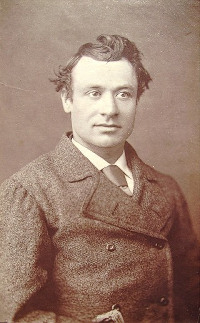What happened to Charles Francis Coghlan. (original) (raw)
| His story is either one of the most incredible tales ever told, pure legend or a mixture of fact and fiction. by Mike Cox |  |
|---|
Agiant storm surge scoured GalvestonIsland on Sept. 8, 1900, sweeping an untold number of people out to sea. Most of them drowned, but some of them were already dead.
The unnamed hurricane, which killed between 6,000 and 12,000 people and still stands as the nation�s deadliest natural disaster, tore some coffins from their vaults in island cemeteries, indiscriminantly mixing the old dead with the new dead. Some caskets were recovered and reinterred, while some were never found. That much is undisputed.
But what of Charles Francis Coghlan? His story is either one of the most incredible tales ever told, pure legend or a mixture of fact and fiction.
 |
Charles Francis CoghlanPhoto Wikipedia Commons |
|---|
Born in Paris to English and Irish parents in 1841, Coghlan took to the stage in 1860 and became a well-regarded actor and playwrite especially noted for his Shakespearian roles. He came to the United States in 1876 and never left. While no stranger to Broadway, he travelled widely with theatrical troupes. In 1898, he produced a play called �The Royal Box� and took it on the road with himself as one of its stars.
On Oct. 30, 1899 the company came to Galveston, but the show went on with Coghlan�s understudy in the limelight. When the actor reached the island city and booked a room at the Tremont Hotel, he was too sick to perform and got no better, dying on Nov. 27 of heart failure triggered by the stress of chronic gastritis. The actor�s death made headlines across the nation and in Europe.
The next day, the Galveston Daily News reported that Coghlan�s body would be shipped to Prince Edward�s Island in Canada, his summer home, for burial. On the 29th, the newspaper ran a followup saying his grieving widow intended to have the body cremated, as had been his wish. But none of Galveston�s funeral homes could provide that service, so Mrs. Coghlan would have her late husband�s remains shipped to New York.
In the meantime, Mrs. Coghlan got word that her daughter had taken seriously ill in Montreal. Fearing she might be about to lose another loved one, Mrs. Coghlan rushed to her daughter�s bedside, leaving her husband�s body in a stout metal casket temporarily held in a �receiving vault� at Galveston�s Lakeview Cemetery. There he remained until the hurricane struck nine months later.
Two weeks after the catastrophic tropical cyclone devastated Galveston, newspapers reported that the actor�s body had been swept away by high water. �It is the supposition of those who have been making every effort to locate the missing casket that it was carried out to sea,� one article noted. The intention had been for the body to be shipped that winter, but the hurricane had intervened, the newspaper continued.
�To Mr. Coghlan�s friends this is the cause of much worry,� a Connecticut newspaper said. �A force of men searched the cemetery and the surrounding country�hoping to find some trace of the casket but their search was unrewarded.�
More than a year later, newspapers said the actor�s casket had still not been found, despite �a scare head and half-column article� in the New York Sunday Telegraph reporting it had been.
In 1904, newspapers reported Coghlan�s coffin had finally turned up on the Texasmainland, but the occupant of the casket must have been someone else, because three years later the New York Times carried a story on Jan. 15, 1907 that a hunter had found Coghlan�s casket partially buried in a marsh in an �out-of-the-way place� about 18 miles inland from Galveston. If that really was Coghlan�s casket, newspapers remained silent on the ultimate disposition of the noted actor�s remains.
Well, at least until 1929. That year, �Believe it or Not� newspaper columnist Robert L. Ripley came out with a widely published column claiming that in 1908 Coghlan�s coffin had washed ashore on Prince Edward�s Island, 2,000 miles by sea from Galveston. Ripley cited as sources two memoirs written by actors who had worked with Coghlan, but it seems more plausible that the tale morphed from the supposed finding of the casket in Texas in 1907.
While the actor�s reputed after-life journey to Prince Edwards Island is generally accepted as a �fakelore,� the basic question remains: What happened to Charles Francis Coghlan?
� Mike Cox
"Texas Tales" September 2, 2010 column
Books by Mike Cox - Order Now